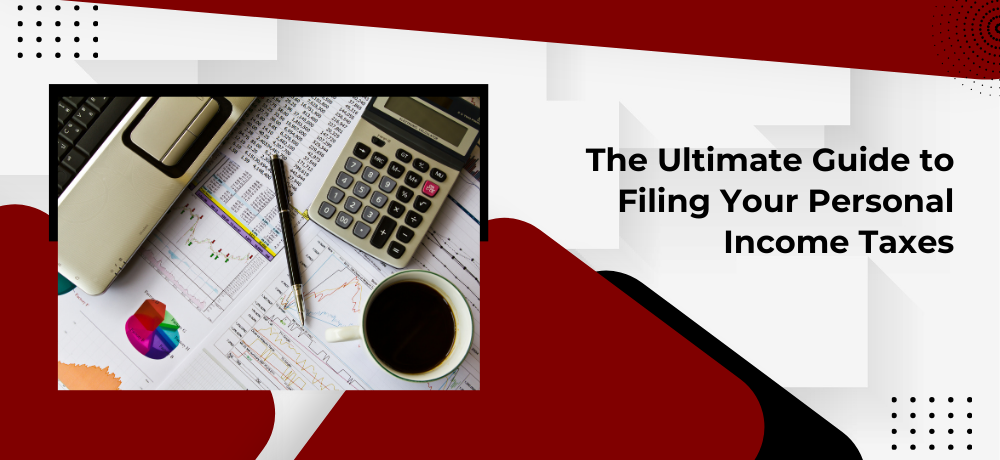The Ultimate Guide to Filing Your Personal Income Taxes

Welcome to our comprehensive guide on filing your personal income taxes. At Rati Raithatha CPA Professional Corporation (RRCPA), we understand that navigating the intricacies of tax preparation can be overwhelming. That's why we've created this ultimate guide to help you understand the process better and ensure that you meet your tax obligations efficiently. Whether you're a seasoned taxpayer or a first-time filer, this guide will provide valuable insights to help you navigate the tax season with confidence.
Understanding the Basics of Personal Income Taxes
What Are Personal Income Taxes?
Personal income taxes are levied on an individual's earnings and other sources of income. These taxes fund various government programs and services, such as healthcare, education, and infrastructure. Understanding the types of income that are taxable and the applicable tax rates is crucial for accurate tax preparation.
Key Terminology in Income Tax
Familiarizing yourself with essential tax terms, such as adjusted gross income (AGI), deductions, credits, and exemptions, is essential. These terms play a significant role in determining your tax liability and potential tax savings.
Income Tax Filing Status
Your filing status, such as single, married filing jointly, married filing separately, head of household, or qualifying widow(er), can impact your tax rates and deductions. Choosing the correct filing status is critical for accurate tax preparation.
Gathering Required Documents
Documents Related to Income
Collect all documents related to your income, including W-2s (for employees), 1099s (for various income sources), and statements from investments, rental properties, or business income. Ensuring you have a complete record of your income sources is the foundation of accurate tax filing.
Deduction and Credit Records
Compile records of deductible expenses, such as mortgage interest, property taxes, medical expenses, and contributions to retirement accounts or charitable organizations. Additionally, gather information on potential tax credits, like education credits or child tax credits.
Previous Tax Returns
Review your previous tax returns to identify any carryover deductions, credits, or losses that may apply to your current tax situation. This can help you maximize tax savings.
Choosing the Right Tax Preparation Method
Self-Preparation vs. Hiring a Tax Professional
Decide whether you want to prepare your taxes yourself using tax software or seek the expertise of a tax professional. Each approach has its advantages and considerations, depending on your financial situation and comfort level with tax laws.
Using Tax Software
If you opt for self-preparation, choose the appropriate tax software that matches your tax needs. Popular tax software programs can guide you through the filing process and help you identify eligible deductions and credits.
Working with a Tax Accountant
A tax accountant can provide personalized guidance and ensure that you take full advantage of all available deductions and credits. They can also help with complex tax situations, such as investments, self-employment income, or multiple income sources.
Filling Out Your Tax Return
Completing the Form 1040
The Form 1040 is the standard federal income tax return used by most taxpayers. Follow the instructions carefully, providing accurate information about your income, deductions, and credits.
Double-Checking for Accuracy
Before submitting your tax return, review it thoroughly to ensure accuracy. Mistakes can lead to delays in processing and potential IRS inquiries.
Filing Electronically vs. Paper Filing
Consider filing your tax return electronically, as it offers faster processing and confirmation of receipt. If you choose to file a paper return, make sure to send it by the filing deadline.
Meeting Filing Deadlines and Payment
Tax Filing Deadlines
Understanding tax filing deadlines is crucial to avoid late filing penalties. The deadline for filing federal income tax returns is typically April 15th, but it may vary slightly in some years.
Payment Options
If you owe taxes, explore payment options like electronic funds withdrawal, credit card payments, or setting up a payment plan with the IRS to ensure compliance without undue financial burden.
Extensions
If you can't meet the filing deadline, you may request an extension. However, it's important to note that an extension to file does not extend the deadline for paying taxes owed.
Filing your personal income taxes can be a manageable process with careful preparation and understanding of the tax laws. Whether you choose to self-prepare or work with a tax professional, the goal is to ensure accurate, timely, and compliant tax filing. If you are looking for personal income taxes, then contact Rati Raithatha CPA Professional Corporation. We offer expert tax and accounting services to assist you in navigating the complexities of personal income taxes. Contact us today to explore how our tailored services can exceed your expectations and help you achieve your financial goals.
Get in touch with us today
To learn more about what we do, please click here. To contact us, please click here or call us at 416-490-6880.